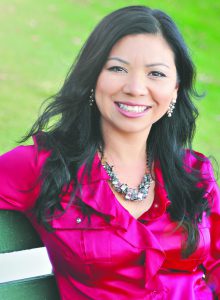Not too many people can say they are passionate about their jobs, but Patty Chavez is one of the lucky ones. She loves her job – and it shows.
Chavez works for South Bay Community Services as the Communications and External Affairs Director. One of her responsibilities is to get the word out on what the agency is doing, and how its programs are helping people out. That insight ranges from shedding light on the painful challenges families go through, all the way to the joy of overcoming them. From separated families to domestic violence and even homelessness, she has seen all types of cases.
“I’m the storyteller,” says Chavez during a one-on-one interview with La Prensa San Diego. “My co-workers do all the hard work. I get emotional with success stories and I also get emotional when I hear cases on child abuse, malnutrition, homelessness; all these things that happen, even before these kids get to us.”
The primary mission of South Bay Community Services is to help, so it is easy to see why Chavez was attracted to this line of work. Be it through educational programs, shelter services, youth support or counseling, the agency has an impressive support system. Amid all the dark news, there are also countless stories of hope.
Chavez has witnessed the satisfaction that comes from helping teenagers choose the right college, while at the same time, explaining the importance of higher education to parents. She has seen families rise from poverty to self sufficiency and from fear to fearlessness.
Growing up in the in the Van Nuys neighborhood of Los Angeles, Chavez lived in a 500-square-foot home with her parents and three siblings. The Chavez household was full of love, but it was impossible to ignore the chaos going on outside.
“Friday nights were about hearing gunshots outside and helicopters flashing their bright lights,” says Chavez. “We would watch TV on our tummy because we never knew what could fly by. There were car accidents and drug dealers. My parents would tell me, ‘one day things may change, but for now, this is how things are.’ That wasn’t a good enough answer for me.”
When she headed off to San Diego State in 1989 to major in Journalism, she thought she had her whole life planned out. Chavez was convinced she would work her way through school, climb the corporate ladder, get a good paying job in media, and live in a high rise in Chicago or New York City.
Getting married and having kids was not for her, she thought; that was back then though. Chavez is now married and has three children. Her life is quite different from what she once envisioned for herself, but eventually, she noticed titles and money felt somewhat empty. Over time, it was her children who actually led the way in her professional path.
As a mother, she started noticing her community more. She also started speaking out both in her neighborhood and with city leaders. She understood the real life effects policies have on everyday life. So, she decided her voice would be heard loud and clear.
Back in 2005, Chavez was appointed to the Chula Vista City Council where she served for one year. During that time, Chavez collaborated with city engineers to promote traffic safety plans around schools, parks and busy roads.
“That transition of being a very active mom and advocate for my children somehow led me to the City Council,” explains Chavez. “I know what can happen to a community when it’s abandoned. I know what happens to neighborhoods and kids when we’re not speaking out or working with our leadership. Where I grew up it was a mess and this can happen in any community.”
Despite all the ups and downs, the importance of higher education was always clear to Chavez and her family.
Her parents are Mexican immigrants who understood the power of education and its potential. Her father, who worked in a factory, had only a second grade education. Her mother started attending school in the United States as a child in second grade. Chavez’s parents were hard working, humble and very determined. The strong family ties she felt growing up have proven essential, especially now that she treads a field where being bicultural and bilingual are key. It is a reality that’s also reflected in some of the shelter services the agency provides.
“For example, if a woman is a victim of domestic violence and doesn’t want to leave the abuser because grandma is staying with them,” explains Chavez, “or if the woman has a son that’s over 12 years old, most shelters don’t allow them to stay in the same room. Or perhaps they have a special needs child. We accommodate for all that. We’re able to bring the whole family in because we understand the family unit.”
Throughout the interview, Chavez stops herself when she starts getting emotional. She gets teary eyed just thinking about all the families that have been helped, and all the others who still need support. It is clear that this is about much more than just a job, for Chavez it’s personal.
“It’s not about producing cookie cutter copies,” explains Chavez. “We want our voice to be reflective of what we do. I look back and remember all those people who helped me and my family out through the years. It’s really come full circle,” Chavez concluded.
